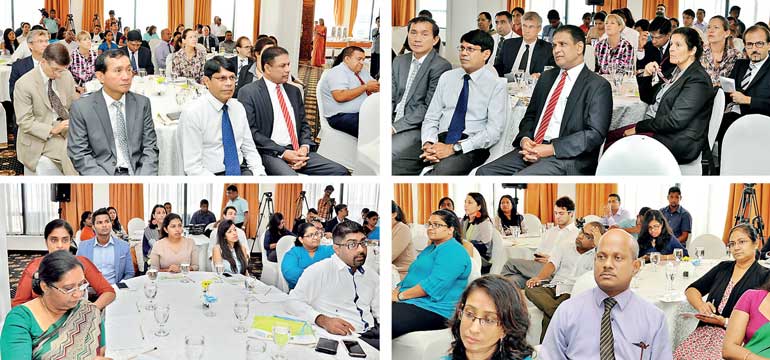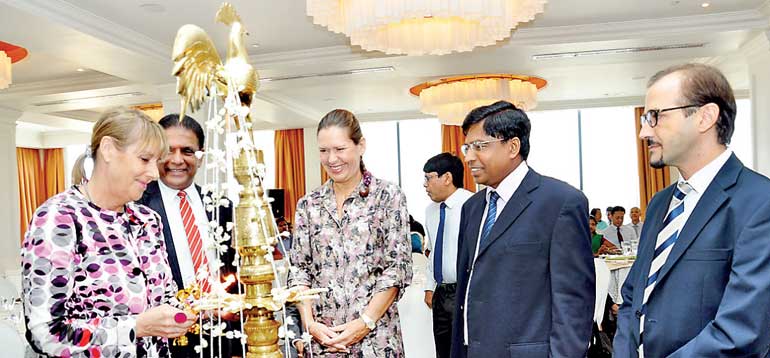Friday Feb 27, 2026
Friday Feb 27, 2026
Wednesday, 18 October 2017 00:04 - - {{hitsCtrl.values.hits}}



By Charumini de Silva
International experts yesterday called for attention to be given to pressing issues that cause rural migration, while insisting on action and investment in Sri Lanka’s food security, nutritional challenges and sustainable agriculture.
To mark World Food Day 2017, dedicated to the relationship between migration, food security and rural development, the Food and Agriculture Organization of the United Nations (FAO), the World Food Program (WFP) and the International Organization for Migration (IOM) organised a discussion in Colombo yesterday.
WFP Country Director Brenda Barton insisted on investing in the food security and nutritional welfare of Sri Lanka’s rural communities in the next few years to build resilience to shocks such as droughts and floods which are the drivers of hunger and malnutrition.
In line with the Government’s Vision 2025, she said there was an opportunity and it was every stakeholder’s responsibility to make sustainable, meaningful and wise investments in food and nutrition security, especially in rural communities.
“Let us provide communities with the means and choice to stay in their homes, where they can enjoy healthy lives and sustainable livelihoods going forward,” she added.
Where conducive conditions for stability and human and economic potential exist, like in Sri Lanka, Barton expressed her confidence that they have real hope that the Sustainable Development Goals (SDGs), including goal number 2 - Zero Hunger - can be reached by 2030.
She emphasised that ensuring adequate nutrition, especially for women and children who bear the brunt of hunger, has a positive knock-on effect on a large number of the other SDGs, including reducing poverty, improving gender equality and health and heightening economic productivity.
Citing the school meals program that WFP supports in Sri Lanka, Barton stressed nutrition links to education achievement as another important area. “A cost benefit analysis estimated that for every $ 1 invested to feed a schoolchild there was an $ 8 return throughout that child’s lifetime in terms of GDP.”
Noting the prevalence of wastage and the fact that the percentage of children under five years of age who are too thin for their height stands at a critical level of 15%, something which has remained unchanged since the last survey, she highlighted the need for immediate action to address household nutrition insecurity.
“The rapid rise in rates of the overweight and obesity, especially among women of reproductive age, what is known as the ‘double burden of malnutrition’ affects 1 in every 2 women in this age group in Sri Lanka,” she said, adding that these problems, which give a clear indication of increasing long-term food and nutrition insecurity in the country, are too deep and vast for any one single entity to tackle.
On a sober note, she said that over 20 million people in Yemen, South Sudan, Somalia and Nigeria were facing the grim spectre of famine at a scale not seen in many years, where many say that what is unfolding is possibly the worst humanitarian crisis since World War II.
FAO Representative Nina Brandstrup stressed that apart from forced displacements due to conflicts, political instability and natural disasters, vast numbers of people also move in search of better food availability, to escape poverty and the effects of environmental degradation and climate change.
Acknowledging that these pressures have created fertile grounds for rises in xenophobia and racism in many countries, she called for immediate attention to be given to derive a political solution at the global, regional and national levels.
“In our modern age, the challenge resides in ensuring that people migrate in a dignified manner and because they want to, not because they feel they have to. Migration should be a choice not a necessity,” Brandstrup said.
She noted that modernising the agricultural sector, improving the resilience of rural livelihoods to climate change and creating business opportunities and jobs in rural areas that are not only agriculture-based were absolute priorities as also reflected in Sri Lanka’s Vision 2025.
Stating that migration has a positive phenomenon, she asserted that given the chance migrants help build the economy of their host region or country by filling labour shortages, bringing new skills, enthusiasm and an entrepreneurial drive.
However, she said too often remittances are used unproductively in many countries, including in Sri Lanka. “These remittances constitute an untapped source of investment in income generation activities. Policies and incentives need to be put in place to encourage a more farsighted use of the financial flows from migrants to help reduce the push for further outmigration.”
IOM Chief of Mission Giuseppe Crocetti outlined three major points which include understanding and addressing the drivers of migration, recognising migration as a resilience strategy and partnership on the impact that food insecurity can have on migration and vice versa.
He said ensuring the viability of agricultural livelihoods requires tackling the root causes of displacement and irregular migration, and investing in rural development.
According to him, under certain conditions and circumstances, migration can be used as a livelihood or coping strategy that has the potential to greatly reduce the exposure and vulnerability of families and communities. “Making mobility an option for these vulnerable households gives them an opportunity to multiply and diversify their incomes, secure resources in the face of hazards and generally enhance their resilience.”
He suggested effectively managing migration can prevent subsequent larger and forced permanent movements.
Pix by Lasantha Kumara